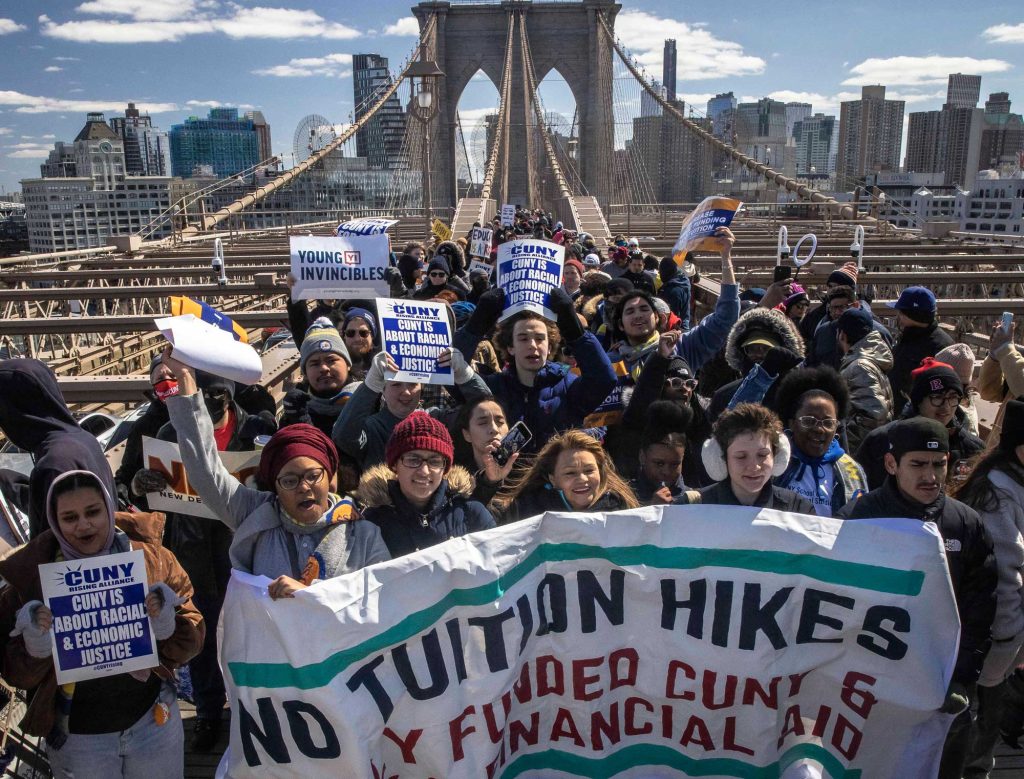
Students lead a march for CUNY funding across Brooklyn Bridge in March. (Credit: Dave Sanders)
Nearly two weeks after the state budget was due, PSC activists and allies told the governor: It’s party time.
With beach balls bouncing, activists one by one did the limbo on Third Avenue on an unseasonably warm and sunny day and asked, “How high can you go, Governor Hochul?” Gathered outside of the governor’s Midtown Manhattan office on April 13, PSC members and other CUNY advocates, including State Senator Andrew Gounardes and Assembly Member Karines Reyes, demanded that the governor lift the bar higher for funding public higher education.
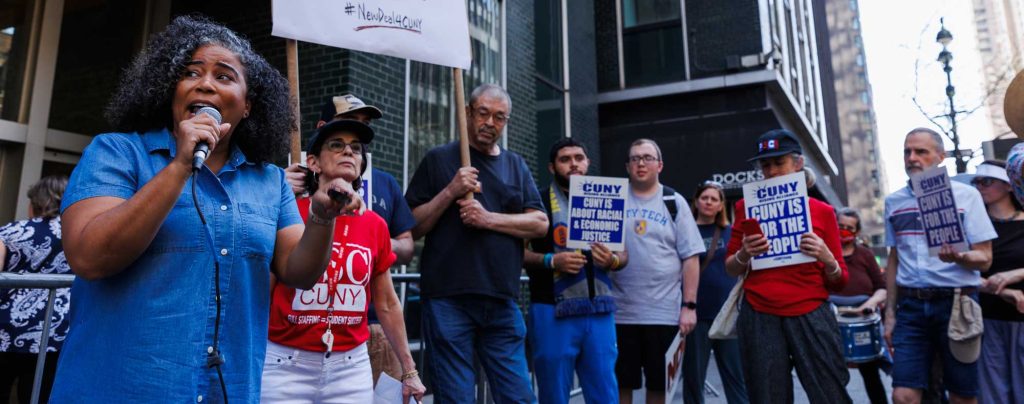
Assembly Member Karines Reyes (left), a prime sponsor of the ND4C, protests outside the governor’s Manhattan office. (Credit: Paul Frangipane)
At the time of the spring break-themed rally, the state budget had not yet been settled, despite it being past its April 1 deadline. News reports suggested that the governor had held up the budget to force through reforms of the state’s progressive bail laws, which have long been the target of conservative politicians.
BUDGET CAMPAIGN
The PSC and its allies – CUNY Rising Alliance, student groups and other public higher education unions – have spent months lobbying, demonstrating and organizing for the budget campaign. Hochul’s budget proposal issued earlier this year was already more generous than budget allotments for higher education under the previous governor, Andrew Cuomo.
As Gotham Gazette noted, Governor Hochul’s budget proposal “include[s] $5.7 billion in appropriations for CUNY, including $1.92 billion in state assistance for operating funds, $3.15 billion from various funding sources (federal aid, grants and scholarships, tuition and fees) and $643 million in new capital funding (in addition to $3.44 billion reappropriated for capital projects).”
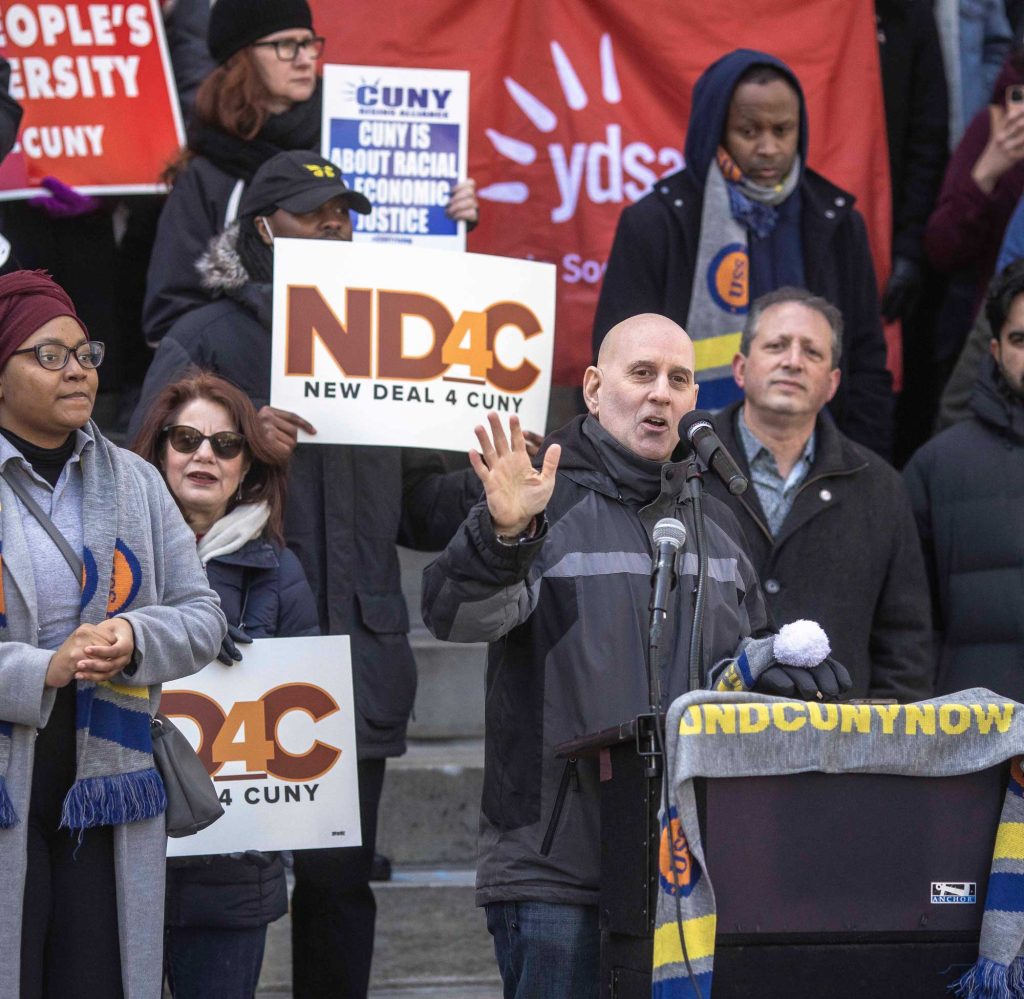
Assembly Member Harvey Epstein supports increased CUNY funding. (Credit: Dave Sanders)
MORE FUNDING
But Hochul’s plan for CUNY this year is still less generous than what CUNY received in the first budget settled under Hochul. “It’s a little better than when Cuomo was in office, but we need to lift that bar,” said Andrea Vásquez, the PSC’s first vice president, in reference to the first state budget agreements under Hochul. “We need to lift that bar way up, and it has to happen this year.”
The state legislature is pushing for more funding for CUNY than what the governor is seeking. “We deserve that investment,” James Davis said at the April 13 rally. “CUNY needs to be a top priority, not an afterthought.”
(Incidentally, The New York Times also revealed that the governor had spent a whopping $2 million on consultant fees to assist her State of the State speeches, which outline her annual budget priorities.)
Winning a good state budget for CUNY is only one step in a larger fight. The union must also organize to fight cuts at the city level. And winning more state and city money is a step forward in the PSC’s contract campaign. The union also fights for CUNY on principle: The union believes that a free, high-quality public education is a fundamental public good that the working people of New York City deserve, and it is an institution that, if properly funded, can go a long way in fighting inequality and racism in our society.
So it is important to understand how the union campaigned for the state budget this past year.
INCREASED SUPPORT
It all began in the fall, when the PSC organized members to pressure the CUNY administration to insist that the state increase funding to CUNY. The administration’s budget ask – approved by the CUNY Board of Trustees – was admirable, but not enough to meet all of the university’s needs. At the time, Clarion reported: “The request, which was approved by the CUNY Board of Trustees in December, asks for additional operating funds of $339 million from Albany and $80 million from City Hall over the current budget, in addition to asking for $983 million for capital projects. In short, CUNY is asking for a 16% increase in state support and 13% in city support, as well as a tuition freeze.”
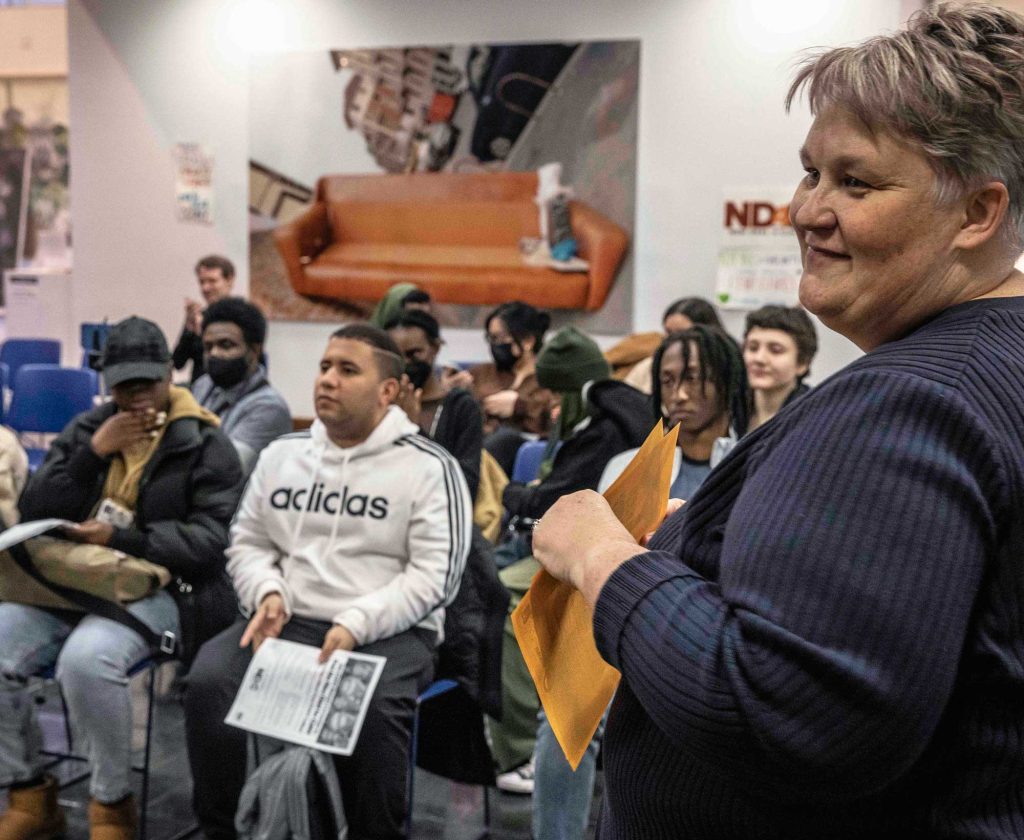
Jen Gaboury, right, leads a teach-in at Hunter College on the ND4C. (Credit: Dave Sanders)
The PSC’s New Deal for CUNY (ND4C) legislation would go further by returning to tuition-free CUNY and increasing the number of full-time faculty and staff members.
In December, the PSC held Union Week, a set of events throughout the university, where faculty and staff demonstrated and organized around linking the struggle for the state budget with the campaign for a just PSC-CUNY contract.
STATE LOBBYING
These events showed that the union and its allies would need to work around the clock and use multiple avenues to pressure the state legislature into backing the union’s New Deal for CUNY agenda in this round of budget negotiations.
Things heated up this spring when PSC leaders, union members and students took multiple trips to Albany to lobby lawmakers in both chambers. In March, the PSC, along with the United University Professions (the SUNY faculty and staff union) and the New York State United Teachers (the PSC’s state-level affiliate), held a massive rally for full funding for public higher education on the Million Dollar Staircase at the capitol building in Albany, followed by a lobbying blitz. Numerous state lawmakers rallied with the PSC and other unionists and students on the steps of the capitol.
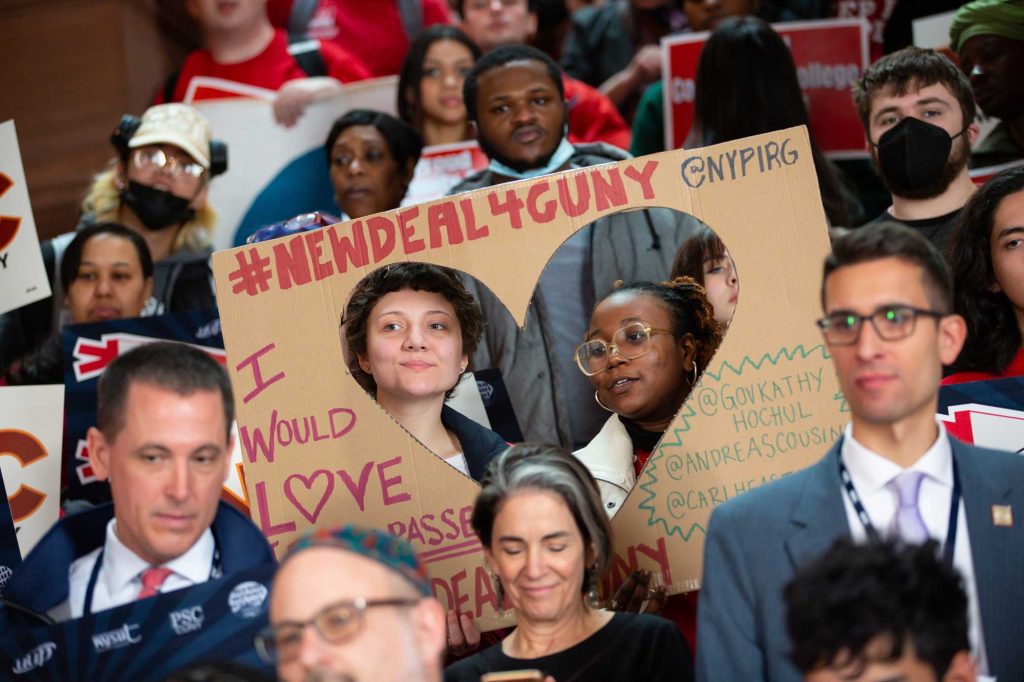
Students and union rally in Albany before a lobbying blitz. (Credit: Patrick Dodson)
Davis also testified before a joint hearing of the Senate Finance Committee and the Assembly Ways and Means Committee on the need for increased CUNY funding.
The PSC joined students for several rallies calling for greater investment and free tuition at CUNY, including a march across the Brooklyn Bridge, a rally at Baruch College and speak-outs at several Board of Trustees hearings.
The union also used mass media to spread its message, airing television advertisements highlighting the importance of fully funding CUNY and taking the message to social media.
Numerous media outlets amplified the PSC and its allies’ message about full funding for CUNY. The Wave, the local paper of the Rockaways, called proposed tuition hikes “ill-conceived.”
SOCIAL MOBILITY
State Senator Iwen Chu of Brooklyn wrote in an op-ed for the BK Reader that the fight for full funding for CUNY was personal. “I have seen firsthand how CUNY invests in people, in families, and our communities,” she said. “CUNY is key to building social mobility – especially for students coming from low-income, immigrant, and minority backgrounds. I represent some of the most diverse neighborhoods in Brooklyn and it is not a surprise that my district has the greatest number of CUNY students. Many immigrant families come to this country for the great opportunities for their children and recognize CUNY as a path to a sustainable career. The fight to keep CUNY affordable and accessible to immigrant and working families is personal for me.”
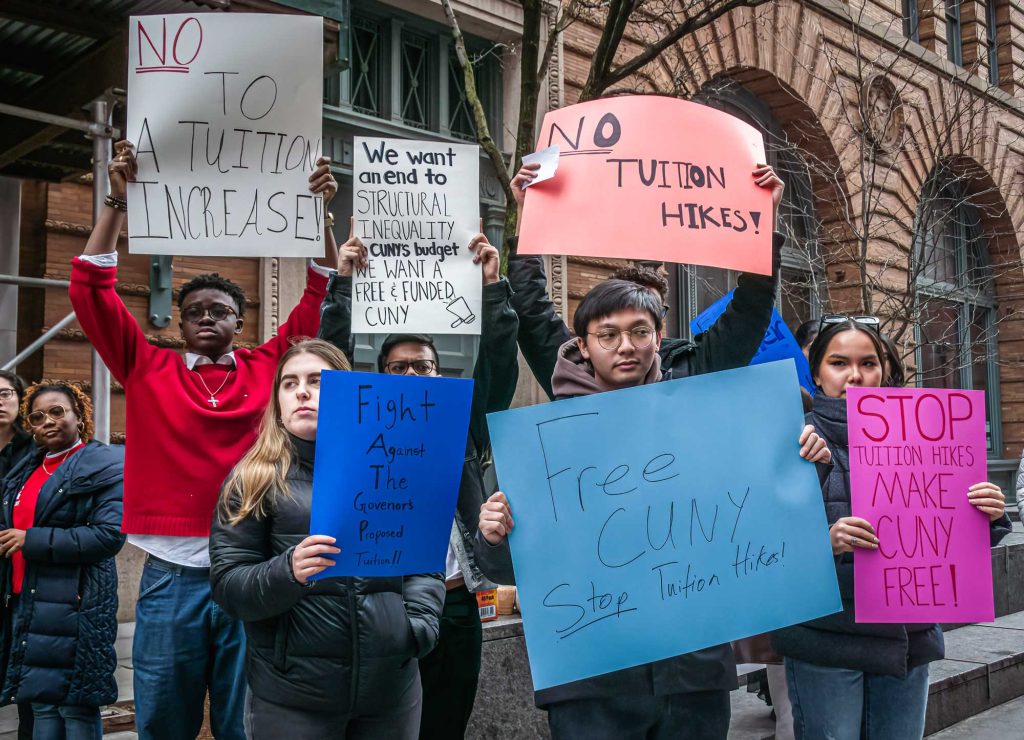
At a rally for a tuition-free CUNY at Baruch College, CUNY students oppose tuition hikes. (Credit: Erik McGregor)
Similarly, Assembly Member Reyes, coauthor of the New Deal for CUNY, spoke at the April 13 rally about why CUNY was so important to her. “I know what CUNY provided for me,” said Reyes, who attended Baruch College. “It was a ticket to the middle class.”
She added that investing in CUNY meant investing in the training of the city’s workforce: nurses, teachers and other public servants. “CUNY is a jewel in the crown of New York,” Reyes said. “We need to invest in it like that’s the case.”
STUDENTS’ FUTURE
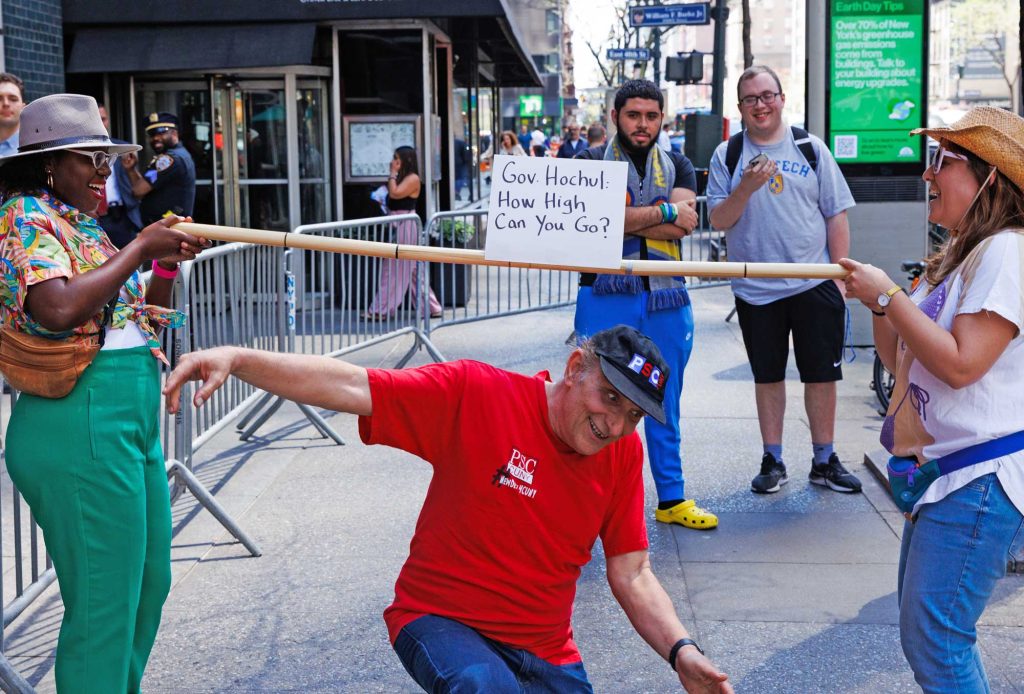
PSC members do the limbo outside the governor’s Manhattan office. (Credit: Paul Frangipane)
Two Beacon High School students, noting the popularity of CUNY campuses as college choices for their peers, wrote in City Limits that the state should pass the New Deal for CUNY legislation. “We need to fully fund CUNY in this year’s state budget, make it tuition-free again, hire more full-time faculty, advisors, and counselors, and fix outdated and crumbling buildings,” they wrote. “Passing the New Deal for CUNY is making an investment in OUR future, the future of current and future New York City high school students who will one day walk through CUNY’s doors. We believe education is a right for all, and passing the New Deal for CUNY helps us make that a reality.”
Even the Daily News editorial board celebrated CUNY’s public service by touting how well CUNY schools rate in national college rankings, saying “CUNY schools are over-performing when it comes to some of the metrics that really count for their students and graduates.”
The union plans to build on this momentum in upcoming campaigns. Over the next few months, it will need to build pressure at the city level to stop the mayor’s proposed austerity budget. And earlier this semester, the union’s contract with CUNY expired. The PSC delivered its contract demands to management, and pressure on CUNY will surely build in the foreseeable future.
Published: April 26, 2023

